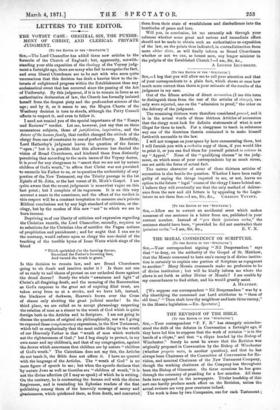[TO THE EDITOR OF THE "SPEOTA.TOR.1 SIR, —I beg that
you will allow me to call your attention and that of your correspondents to a plain fact, which shows at once how much more correct than theirs is your estimate of the results of the judgment in my case.
Out of the fifteen articles of direct accusation (I use this term to distinguish them from the rest of the articles of charge), two only were rejected, one on the "admission to proof," the other on the delivery of the judgment.
The remaining thirteen were therefore considered proved, and it is in the actual words of these thirteen Articles of accusation that the clergy must look for definite statements of what is now illegal for them to teach. For a clergyman to teach in substance any one of the doctrines therein contained is to make himself forthwith amenable to the law.
I will not trespass on your space by here enumerating them, but I will furnish you with a verbatim copy of them, if you would like to print it, or you can find them for yourself printed in extenso in my "Appeal." None of the "qualifying clauses" in the judg- ment, on which some of your correspondents lay so much stress, can set aside the force of actual fact.
The untrue character of some of these thirteen articles of accusation is also beside the question. Whether I have been really guilty of saying the things imputed to me, or not, leaves no option to the future " legal " course of the clergy I leave behind me. I believe they will eventually see that the only method of deliver- ance from the new and old fetters is by appealing to the Legis- lature to set them free.—I am, Sir, &c., CHARLES VOYSEY.


































 Previous page
Previous page